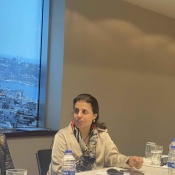Lecture series details tips for reporting on gender-based violence
A lecture series organized by Birzeit University’s Media Development Center (MDC), the United Nations Office on Drugs and Crime (UNODC), and the Ministry of Women’s Affairs advised journalists to avoid creating stereotypes, causing scandals, or chasing scoops when reporting gender-based violence cases and covering stories of women who have experienced violence.
During the lecture series, justice practitioners and experts in social protection recommended to abide by an editorial style and publication policy that is sensitive to the survivors’ story and respectful of their privacy. Media reporting, they advised, especially when done through feminist organizations, should be very professional and could help increase humanitarian assistance or ensure that it is suitable for the diverse needs of women.
Nahed Abu Taimeh, gender coordinator at MDC’s Research and Policy Unit, pointed out that this three-day lecture series is significant for journalists. As it familiarizes them with the legal, social, and political context of gender-based violence and covers the effective and ethical use of sources, it enables them to speak openly about the persons who have experienced violence and helps them tell their stories efficiently and impactfully.
Mutasem Awad, National Project Manager at UNDOC, talked about human rights organizations’ efforts to eliminate gender-based violence in Palestine, referring to the joint UN program “HAYA: Eliminating Violence against Women in the West Bank and Gaza Strip (2018–2022).” HAYA, Awad explained, aims to abolish harmful practices, to change attitudes that contribute to violence against women and girls, and to help survivors of violence gain access to necessary services such as livelihood training, medical and psychosocial treatment, and security and shelter.
Workshop participants stressed the need for creating a special booklet that contains the preferred legal terminology to be used when covering violence against women, alluding to the fact that variations in terminology can greatly shape and influence how communities and decision makers view and evaluate such issues.







